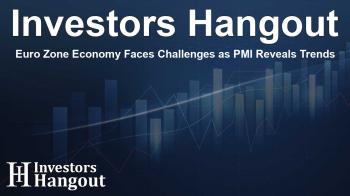Euro Zone Economy Faces Challenges as PMI Reveals Trends

Overview of the Euro Zone Economy in December
The latest data reveals that the euro zone economy concluded the year in a delicate state. According to a comprehensive survey, overall economic activity experienced a contraction for the second consecutive month in December. This decline, however, was somewhat mitigated by a modest upswing in the services industry, unable to fully counteract the significant setback in manufacturing.
Purchasing Managers' Index Insights
The HCOB final composite Purchasing Managers' Index (PMI), a reliable indicator of economic health, increased to 49.6 in December from 48.3 in November. This figure edged just above the preliminary estimate of 49.5 but still remained below the 50 threshold, which indicates a transition from contraction to growth.
Services Sector Performance
The services sector, which plays a critical role in the euro zone economy, demonstrated resilience with its PMI rebounding above the neutral mark to 51.6 after falling to 49.5 in November. While this signals some growth in services, it was offset by a more pronounced decline in factory activity.
Expert Opinions on Future Prospects
Cyrus de la Rubia, the Chief Economist at Hamburg Commercial Bank, noted that the December PMI data doesn’t create an ideal foundation for a service sector boom in 2025. However, he pointed out that the decline in incoming business has halted and that the reduction in order backlogs has lessened. He emphasized that service providers aren't as directly impacted by external pressures, such as U.S. tariffs, providing them a slight advantage over the manufacturing sector.
Market Reactions and Business Indicators
As the economy experiences these fluctuations, the services industry's new business index—a crucial gauge of demand—returned to growth after three months of diminishing performance, reaching 50.2 in December from 48.1 in November. This growth occurred despite rising prices as firms attempted to offset escalating input costs, with the composite output prices index climbing to a four-month high of 52.5 from 51.9.
Implications for Monetary Policy
At a recent press conference, European Central Bank (ECB) President Christine Lagarde stressed that services inflation remains excessively high. The December PMI survey underlines this continued inflationary pressure, suggesting a cautious approach in monetary policy. Experts anticipate that the ECB will proceed with selective interest rate cuts in the first quarter of 2025, following a fourth reduction in December.
Impact of Political Uncertainties
Political instability within the euro zone and looming threats of a trade conflict with the U.S. are central challenges facing the economy. The ECB's decision to cut interest rates reflects ongoing concerns about these factors influencing economic performance. According to a recent poll, it is likely that the ECB will reduce rates by at least another 100 basis points this year, in response to the prevailing economic conditions.
Frequently Asked Questions
What does the recent PMI data indicate about the euro zone economy?
The recent PMI data indicates a contraction in the euro zone economy, with manufacturing experiencing significant downturns, though some recovery in the services sector emerged.
How is the services sector performing compared to manufacturing?
The services sector has shown resilience with a PMI above neutral at 51.6, while manufacturing continues to decline, highlighting a divergence in sector performance.
What are experts predicting for the euro zone's economic outlook in 2025?
Experts are cautious about the euro zone's economic outlook for 2025, noting that while the services sector may help, overall economic growth could be limited due to current challenges.
What actions is the European Central Bank taking in response to economic conditions?
The European Central Bank has cut interest rates multiple times and is expected to continue this trend, indicating its approach to combat economic challenges and inflation.
Are there political factors influencing the euro zone economy?
Yes, political instability within the euro zone and potential U.S. trade tensions are significant factors affecting economic stability and confidence among businesses and consumers.
About Investors Hangout
Investors Hangout is a leading online stock forum for financial discussion and learning, offering a wide range of free tools and resources. It draws in traders of all levels, who exchange market knowledge, investigate trading tactics, and keep an eye on industry developments in real time. Featuring financial articles, stock message boards, quotes, charts, company profiles, and live news updates. Through cooperative learning and a wealth of informational resources, it helps users from novices creating their first portfolios to experts honing their techniques. Join Investors Hangout today: https://investorshangout.com/
Disclaimer: The content of this article is solely for general informational purposes only; it does not represent legal, financial, or investment advice. Investors Hangout does not offer financial advice; the author is not a licensed financial advisor. Consult a qualified advisor before making any financial or investment decisions based on this article. The author's interpretation of publicly available data shapes the opinions presented here; as a result, they should not be taken as advice to purchase, sell, or hold any securities mentioned or any other investments. The author does not guarantee the accuracy, completeness, or timeliness of any material, providing it "as is." Information and market conditions may change; past performance is not indicative of future outcomes. If any of the material offered here is inaccurate, please contact us for corrections.
